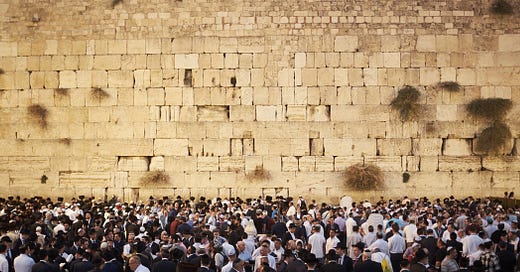It’s been a turbulent and difficult week. We had the disquieting task of sorting out our emotions when the shocking news about Israel arrived on Shemini Atzeret. The holiday of Simchat Torah, a day of joyful celebration and a time to be over-the-top-happy — felt unfitting for the moment. Our ambivalent emotions were unsettling: We wanted to be happy, but could not ignore our grief. Nonetheless, my immediate reaction was that going ahead with our Simchat celebration was the right thing to do. Upon further reflection, I still think it was the right move.
It is common to think of happiness as the result of fortunate events – a function of circumstance. Of course, sometimes it is. But one of the most important lessons from Sukkot, the holiday of happiness that culminates in Shemini Atzeret, is that we can choose to be happy; that happiness can be an avoda, a service of God.
Certainly, there are moments of deep sadness in life and it is essential to acknowledge this sadness. But it is notable that even in the month of Av, when we mourn over the Beit Hamikdash, we are taught “Misheichnas Av, mimaatim b’simcha,” that we are to diminish our level of happiness, not eliminate it.
Sukkot is a time when we learn that expressing happiness is a form of service to God. During the Simchat Beit Hashoeva in the Beit Hamikdash, we offered water libations (as opposed to the usual wine libations) while celebrating joyously. The Rambam characterizes this happiness on Sukkot as avodah/service.
This concept that happiness can be a service to God is rooted in creation as well. In this week’s Parsha, Bereishit, we read that God initially watered all vegetation by creating a mist emanating from the ground. Rashi explains that God did not create rainfall until after He created human beings because He embedded in creation the need to receive our appreciation and our prayers for rain. We learn from this that we pray for rain not just to satisfy our own needs but because God has made the world “dependent” on our service of prayer.
As we discussed a few weeks ago, that is why we have two types of prayer. One kind is personal, a plea from our hearts. The second type is the avodah, the service, which corresponds to offerings in the Beit Hamikdash. For this reason, the main prayer service, the Amidah, is composed of mandated wording, in plural form. When we recite a prescribed form of prayer, we express our collective responsibility to trigger certain events.
Ideally, our tefillah should also teach us to genuinely care about the people we are praying for. But by prescribing the content and wording of our prayer service, our Sages were emphasizing that, regardless of our personal needs and feelings, we are obligated to pray for the welfare of the Jewish people and the world.
So just as last week our celebration of Simchat Torah proceeded as an avoda, despite our ambivalence and worry, our prayers during this time fulfill the same purpose. We undoubtedly have a heartfelt concern for our brethren in Israel along with an intense desire to help in whatever way we can. Along with the important financial and other contributions we can make during this turbulent time, we must not forget our avodah of prayer for the people of Israel.
When Yitzchak bestowed his blessing upon Yaakov, he stated "HaKol kol Yaakov," the voice is the voice of Jacob. According to our Sages, this passage highlights the two fundamental strengths of the Jewish people, two ways to connect with God, both rooted in our voices.
First and foremost, it is our dedicated study of Torah, proclaimed aloud, that empowers us. Therefore, in these critical times, we must strive to enhance our Torah study.
The second “kol" is our other voice through tefilla, prayer. That was the significance of why we said Tehilim for Israel during and after the Simchat Torah services at Mekor: We pray with our hearts and souls to connect with the Jewish people and convey to God that we care deeply about our brethren in Israel and beg God to help us through this difficult time. We pray to express our fervent hope that those who lost friends and family will be comforted, the injured victims will be healed, the captives will return home safely, and the Jewish people will finally live in Israel in peace.
Shabbat shalom. May Hashem bring shalom, lasting peace to Israel this Shabbat.
Eliezer Hirsch


